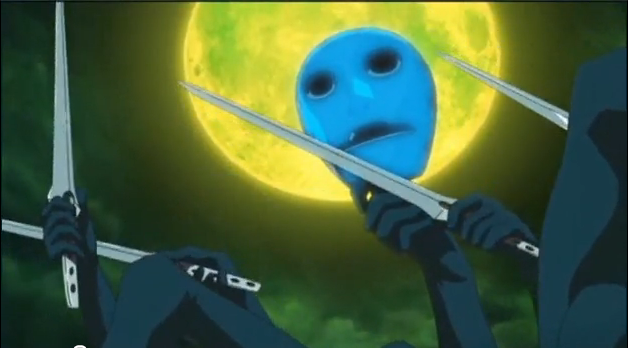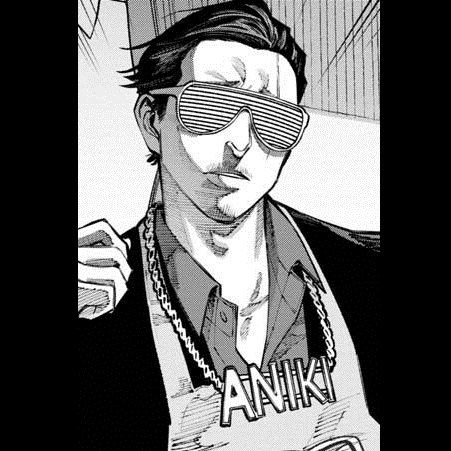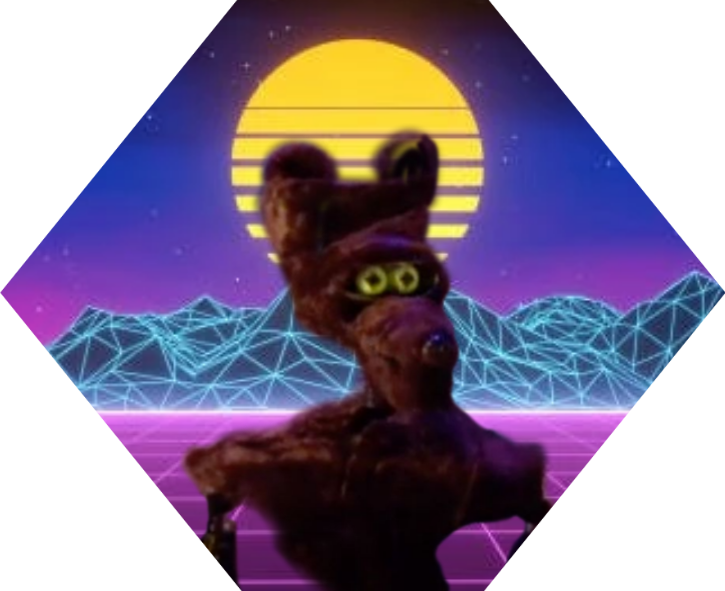Spider-Man 3 should introduce Gwen Stacy as a trans woman to incinerate ![]() brains
brains
I can't really fully agree with this. Superheroes have a lot less to do with fighting social injustices than they do with upholding the status quo and celebrating the military industrial complex.
Chad Naruto:
- Hard work beats out talent.
- Naruto is an outcast for being a "freak" turns out what makes him a "freak" ends up saving everyone's ass multiple times.
- Yeah, Naruto was one of 'the specials', but at what cost?
Eh, in the later parts of the series we learn that he basically had the president looking out for him the whole time, and he gets access to special instruction just based on who he is. Not only does he become super special, it is revealed that he was super special and had special privileges all along. He just didn't know it.
Rock Lee shows the true limitations of hard work in the setting. Got his ass whooped a couple of times when anyone reasonably special showed up and then faded into irrelevance. He unfortunately lives in a world where hard work simply isn't enough.
Yeah, it's a real missed opportunity. I really like Naruto but at the end of the day it's a comic book for 10 year old japanese kids in the early 2000s, and that's the kind of shit that works for that demographic.
The only good Naruto character was Rock Lee and they did him dirty in the Gaara arc.
True. Like a lot of things, superhero comics started out with working-class origins and generally took a stance on things, even in a liberal way. But they were definitely used to promote and encourage social change, such as the civil rights allegories of the X-Men, the racial topics with Black Panther, etc.
But of course, comics got popular, and profitable. When capitalists got their hands on this art, they began to do their usual thing of twisting art, no matter how subversive it may have been, into reinforcing the status quo. Now, very few comics actually had real leftist messaging, but any progressive themes that they may have once had have been swallowed up by the Disney machine.
The first multi-issue story arc in Marvel comics was actually about T'Challa, the Black Panther, leading a prosperous African nation in the comic Jungle Action (Yeah, that name is pretty racist now). The arc right after that has Black Panther fight the KKK, despite pushback from the public (dumbass white nerds) and even some Marvel staffers.
Take the same arc in the modern movies, with Black Panther (2018). All the progressiveness is surface level. T'Challa allies with the CIA to fight comically-evil revolutionaries that make very real points about the status quo. Just embarrassing slop from the capitalists. All I can think about is that Disco Elysium quote, about how Capital can even subsume all critiques within itself, and turn them into propaganda.
I'm no comics expert (I haven't read all that many) and comics have always included many brainworms. But they definitely were cooler back when they weren't written by billionaires to sell worldwide.
we will have this debate over and over forever until cape comics are finally abolished under the DotP.
Many of them had some real fucking problems long before the first Iron Man movie
Then your initial caveat means nothing because we aren't talking about fucking Speed Racer
There's a certain irony that Ditko, a staunch objectivist, died penniless and alone, having been screwed over by Marvel so that they could make billions off of Spider-Man over the years
You know what's insane? Stan Lee got him into Rand in the first place. I can't dislike Ditko, he seems like someone so out of his element who was sold a lie so he could be exploited. Ironically not disimilar to how his Spidey originally was a bullied kid who wanted to BE the bully before he got a wake-up call
From what I've heard about the man, if he were ever to be happy with anything, the effort would cause his head to spontaneously combust
Also, like, that is graffiti. What do you expect? For them to deliberately exclude the big graffiti projects that have even nominally progressive messaging?
yes, only star wars characters saying the most uncontroversial things possible. like a pic of chewbacca in rainbow colours, also he has sunglasses and a cigar, saying "no bad things"
Spider-Man 3 should introduce Gwen Stacy as a trans woman to incinerate
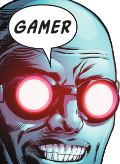 brains
brainsWeren't reactionary dorks mad that some people were reading Ghost Spider as trans in the new Spider Man movie? (Haven't seen it yet)
Yep, even though it wasn't actually a plot point. There was just a lot of subtext about choosing your own identity, and her scenes were full of trans colors (and I think a trans flag?)
Proof that chuds only care about subtext when they can whine about it
She literally has a "protect trans kids" flag in her room and her cop dad has a trans flag patch. No way a cop wears a patch like that unless it's for their own kid (if even).
Plus the subtext someone else mentioned.
Wtf are you even talking about? You can't even punch cops in this clone of Arkham series.
Peter Parker is/was a college republican libertarian and marvel censored this in the bideo game.
Pete just wishes those protesters would pick themselves up by the bootstraps, that's all
There is a panel in the old comics where he's mad that people are protesting Vietnam
Literally never happened. Neil Gaiman misremembered that and now people have decided it is face and even made reference to it in the comics. All as part of a larger trend to make a binary of Randian Ditko and cool liberal Stan Lee. Except Ditko said nothing about the war and never had Peter be angry at protestors, while Stan was against pulling out of Vietnam and had peter mock protestors, albeit not over Vietnam
In Jonathan Ross’ BBC Documentary on Steve Ditko, Neil Gaiman mentions the protest scene of ASM#38 as an example of the disputes between Stan Lee and Steve Ditko.
“There are famously a number of issues they clashed over. Stan is meant to have looked at comments of Ditko’s where Spider-Man is swinging past protestors and he’s meant to be saying things like, ‘look at those dirty hippies down there’ and Stan would go in and give him a word balloon and say ‘hey kids, I’m with you’ and whatever. You feel politically, there’s a wonderful sort of clash there between Swinging Stan Lee and magnificently uptight, world class uptight, impossibly uptight Steve Ditko!”
There’s a major problem with Gaiman’s quote. The scene he talks about never happened. The protest scene of ASM#38 shows the dialogue by Stan Lee as unsympathetic to the protestors exactly as the art indicated by Steve Ditko. To the extent there were clashes between them it had nothing to do with that scene. Obviously, the revelation of Lee’s own fascination with Rand and his libertarian moderate leanings happened after 2007, under Blake Bell’s biography in 2011, and Riesman’s biography in 2021, so Gaiman can’t be faulted for not having access to the freshest research. But one can well argue how a person so intelligent as Gaiman, so nuanced and learned, failed to commit the close reading to support his claim. Gaiman’s quote in the BBC documentary which aired in 2007, thanks to his great prestige and fame, legitimized the notion of the dichotomy between “Liberal” Stan Lee and Objectivist Ditko.
As for the scene
The scene is a single page, a 8 panel grid. It shows Peter walking alone past campus while Flash, Gwen, Harry who are Peter’s bullies in his college era in the Ditko run comment on the sides. The protestors are an all-white group, and they are specifically listed as “protesting tonight’s protest meeting” in other words it’s a non-political protest event. Symbolically of course the entire scene portrays college protests as somewhat frivolous so it can be seen as mocking, though as stuff goes it’s pretty mild. We also have Gwen, Harry, Flash attacking Peter because they think he’s joining the protests but then they make fun of him for being too spineless to march which attacks the hip posturing involved in performative activism.
Now as drawn and plotted by Ditko, this is a mild bit of comedy showing how the college social scene is different from the high school era but at the same time, Peter’s still misunderstood and made fun by Flash. The dialogues by Stan Lee (perhaps following Ditko’s indications), portrays a studiously non-political protest. Now you might see this as implying that all college protests are frivolous but for me, it shows this protest as frivolous in content, rather than showing protesting as being frivolous in essence, such as Robin Wright’s Jenny’s ’60s hippie arc in the movie Forrest Gump which shows the counter-culture era of the ’60s as a downward arc for the girl who tried to escape her family and ultimately get AIDS, and whose main legacy is leaving behind a kid with the “good ol’ Southern Kid” (who descends from KKK founder Nathan Bedford Forrest — yep that movie didn’t age well). One of the protestors when attacking Peter for not joining in says he listens to “Lawrence Welk” i.e. a 60s entertainer known for “champagne music”. So this isn’t exactly about political attitudes.
A close reading of this scene finds it lacking in teeth, and it doesn’t seem anything that Lee or Ditko gave any time or mind to in the charting of this issue. Which stands at odds with the mountain of commentary that this protest scene has gotten.
Here is the Ditko one
Show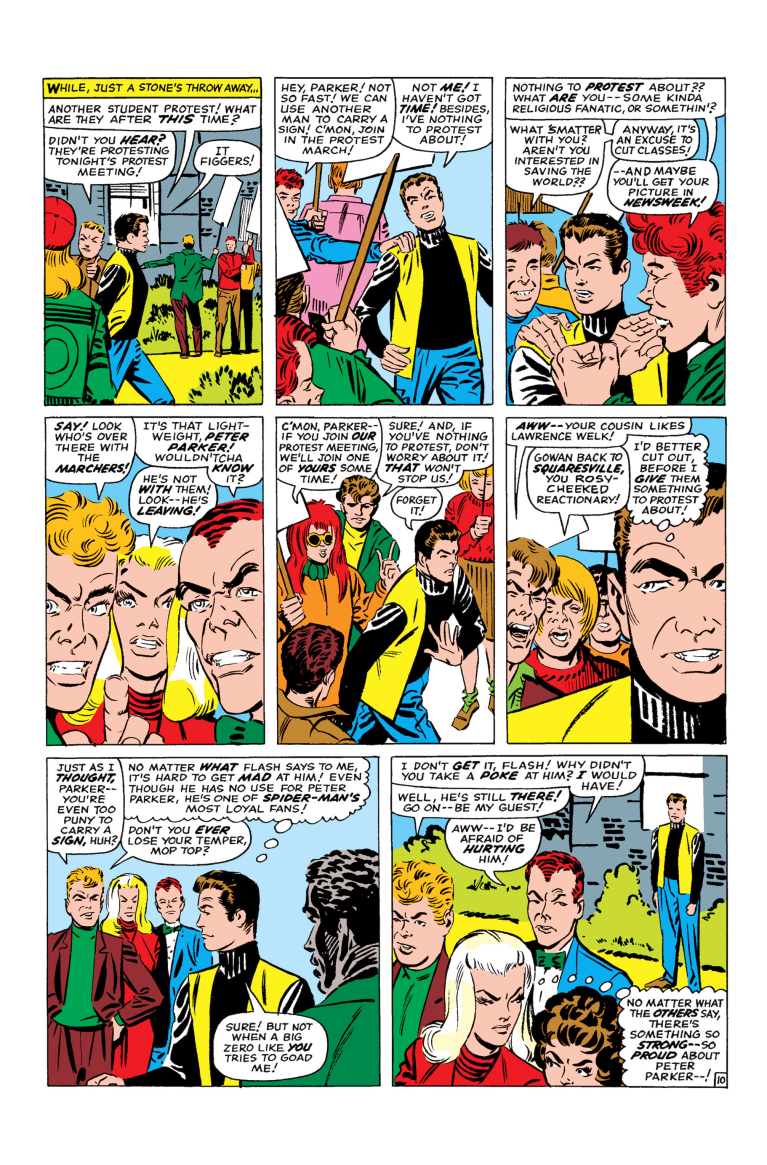
and here is the purely Lee and Romita one
Show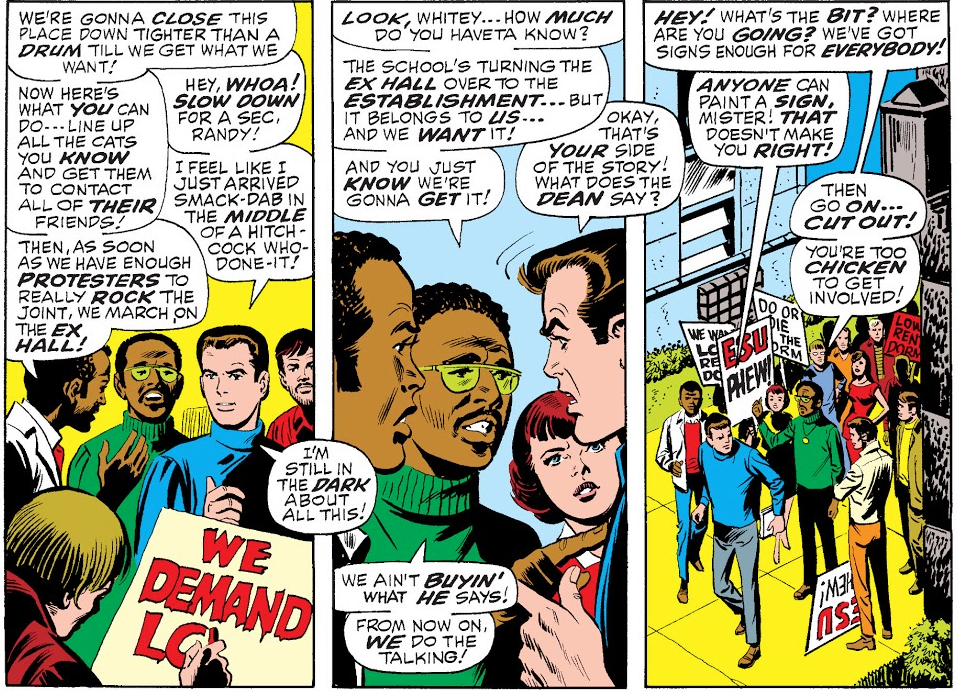
It’s virtually the same comic thirty years later but unlike Ditko’s brief 8 panel grid which is a side gag to larger story, ASM#68 is explicitly about student politics as a major subplot, featured on the cover and the title “Crisis on the Campus” and we have Peter walk away from solidarity from an African-American led protest. Where Ditko satirized a protest as frivolous in content, Lee and Romita satirize protesting as frivolous in essence. So the question is why does this scene written and drawn after Ditko left, not subject to scrutiny of any kind? From Riesman's biography of Lee Stan’s dialogue played with fire, putting words like,’ ‘Uncle Tom,’ and ‘soul-brother’ into black characters’ mouths and depicting Peter as telling them to see the administration’s side of the story and yelling, ‘ ”Anyone” can paint a ”sign,” mister! ”That” doesn’t make you ”right!”” There’s no real resolution to the political questions posed by the comic, merely a bizarre deus ex machina in which the protest leaders are arrested on the false belief that they were linked with the Kingpin, something the reader is supposed to see as a positive event because the courts will surely exonerate them. Even jail is a bonus, muses Peter: ‘And they’ll ”all” have a chance to ‘cool off!’
Show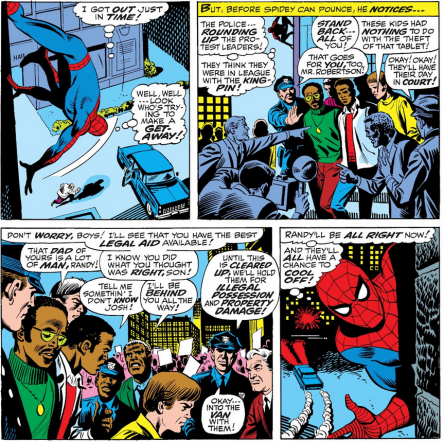
All this because Gaiman couldn't be assed to check first and cause it fits a really simple narrative that reinforces Lee's persona as a cool uncle and not a conservative exploitive asshole. Down with Lee, uphold Kirby thought
Not every superhero has to be woke.
There is a real contradiction between the people that want heroes of the nation state vs heroes of the people.
Or if you prefer, bourgeois heroes and proletarian heroes.
Batman is a bourgeois hero. Spiderman is a proletarian hero.
Fighting for the poor vs fighting for the cops.
Bourgeois heroes are essentially just super cops.
It's funny cause Superman often does fight for the cops and their system of justice while Batman, at least in his first years in all continuities, fights corruption and against the cops. I always think of the line from Arkham Origins when Gordon says "we've earned the people of Gotham's respect" and Batman responds: "if that was true, I wouldn't be here"
Year One is so full of commentary on the police, especially in the trade's additional "Gotham crime blotter". Sure it goes in a somewhat reactionary punisher direction, and shades of later Miller are 100% there, but the heart of it is angry at the police.
My point is Batman says ACAB...to a point https://www.youtube.com/watch?v=3pkR6fnAlWQ
Wonderful article on the limitations even in Batman stories that do show corruption and try to address real issues. Honestly I would love to see this kind of dive into the Riddler's militia guys because there is a LOT to be said there
Spidey I have come to really appreciate for never really being not antagonistic with cops in the comics. The video game is insane in how much it fellates the police at every turn. It hit me that Spidey in the comics as default is hunted by cops, he cannot even hand criminals over without getting shot at. Makes him super unique
Wonderful article on the limitations even in Batman stories that do show corruption and try to address real issues. Honestly I would love to see this kind of dive into the Riddler's militia guys because there is a LOT to be said there
Supposed to be a link for this?
Spidey I have come to really appreciate for never really being not antagonistic with cops in the comics. The video game is insane in how much it fellates the police at every turn.
Videogames have a real problem not turning "do jobs for the cops" into a gameplay loop. It's an incredibly easy gameplay loop to do so they often fall into it.
Bourgeois heroes are essentially just super cops.
Or vigilantes that border on being paramilitaries.
Captain America: but I wanna stand like a tree and be firm, fuck international law and accountability.
God he really did become a wonderful embodiment of America in a way they didn't intent
The only Spiderman I recognize until trans Gwen Stacy will be Miles just to infuriate comic crackers
Captain America's parents died during the Great Depression and he cited FDR's New Deal for why he survived.
He was a sickly art student before he got superpowers and explicitly fought nazis. I mean that was part of a trend of comics at the time, but they can't undo the fact that he punched Hitler.
It's interesting that comics are getting worse in certain ways, but not in the ways chuds think.
Marvel and DC are homogenizing their media for Disney and Warner. Extended universes, IP laws, and the genre's tendency to embrace the status quo means that making meaningful and permanent changes to continuity of almost impossible.
Being mad at depicting contemporary New York in a videogame is such a dumb hill to die on.
It's sad really. The chuds are witnessing the contradictions of capitalism but are reaching the totally wrong conclusions.
Ditko's objectivism is oversimplified and overstated. The reality is really telling. Kudos to an amazing piece of journalism by Jack Elving. So it seems Stan was the one who introduced a young Ditko to Rand. On top of that, Ditko really didn't put his politics into Spider-Man, most of that comes later AFTER he leaves Marvel for exploiting him.
The revelation that Stan Lee was a fan of Rand’s fiction and that that it was he who, indirectly, plunged Ditko into the vat of acid of Objectivism has been available since 2011 when Bell published his book though curiously it has not gotten much or any commentary. Perhaps because it unbalances the binary of the Ditko Randian/Liberal Stan idea. It’s well established that Stan Lee yearned for a literary career and kept up to speed with latest fads and crazes. So Rand’s fame and success would not have escaped his attention. In light of Riesman’s biography, Lee being partial to Rand’s ideal of individual self-reliance and assertion, and the concomitant self-righteousness she vicariously espouses on behalf of big business, is no great shock.
......All this is to say that until the 1960s and 1970s it was possible to be a Rand fan without being a Randian. The question is whether we understand Lee as a Rand fan or a Randian? Someone who liked the popular fiction of Rand without taking any purchase of her ideas, as opposed to Ditko. There’s evidence for both.
...According to Mark Evanier (based on conversations he had with Kirby), Jack originally intended for this storyline to represent his take on the Objectivist philosophy. What Jack had read of Ayn Rand and had explained to him had gotten him to thinking about the philosophy and its pitfalls (some, of course, will dispute that there are pitfalls in it and that is their right), which led him to do a story about it. Jack probably did not consciously think, “Here’s my answer to Ayn Rand”; his primary goal was, as always, to just write a good story. But in Jack’s original story, the scientists are well-intentioned, with no evil plans. They are attempting to create a being totally self-sufficient, intellectually self-reliant; not encumbered by superstition, fear, or doubt; in short, a being based on Rand’s absolutes. Of course such a being would be totally intolerant of those who created him; a truly Objectivistic being would not cope with the flaws in others. Whatever the case, according to Evanier, when Stan received the first part of this storyline, he felt that changes had to be made. Perhaps he found its content too negative to a given philosophy, politically-based, or simply confusing to him. Stan didn’t notice any villain in the story and almost always felt that every story had to have a bad guy, so he had to come up with one. He could only choose between the being or the scientists and it was simplicity to just go the “Mad Scientist/Sympathetic Creature” route; it worked for Frankenstein, right? During these years Stan would have photostats shot of Jack’s artwork, to be sent back to Jack so that he could remember his plot continuities in these multi-part stories of his. These photostats would have Stan’s dialogue intact to show Jack how Stan was interpreting the stories. When Jack received the photostats to issue #66, the first part, he wasn’t pleased at all. His storyline had been corrupted; the entire reason for the story had been gutted, replaced with a standard comic book plot; and he was now (due to the fact that this issue was going to print) forced to change the rest of his story to support Lee’s version. Jack may have intended for this story to be longer, but after seeing this, the story would be ended with the next issue. In short, Stan Lee censored an anti-Rand satire from Jack Kirby. Gartland allows Lee a benefit of the doubt in that this wasn’t directly political but simply a case of not understanding the motives, and that’s likely. But there’s enough grounds to presume that Lee didn’t want to attack Rand or critique her ideas even indirectly, and that suggests personal bias. If that’s the case then that does imply a degree of commitment on Lee’s part to Rand’s reputation and fame. Some have argued that this was done out of consideration for Ditko, but by 1967, Ditko had left Marvel for more than a year. So there’s little reason to presume that peace in Marvel office was any reason to uphold this. Lee moved to censor an Objectivist satire after Ditko left the building so to speak, right before the publication of Mr. A established Ditko as an objectivist.
Abraham Riesman’s biography sheds far more light on Stan Lee’s personal moderation in politics. And the image is someone who was far more of a middle-of-the-road player. When describing footage of an attempt at a talk show Lee tried to launch in the late ’60s, Riesman observes: ...However, whenever he’s confronted with radical ideas, he is swift to denounce them from his point of view as a liberal member of what he calls “the Establishment.” The war in Vietnam? He finds it “indefensible,” but “there are too many other things involved” for it to just end right away. What of the agony of the African American population in an era of racist candidates calling for “law and order?” “I just don’t think the solution is to throw bricks in windows or to say ‘If the law doesn’t satisfy us and it doesn’t make everything perfect, then let’s abandon the law or let’s make up our own laws’ ” is Stan’s conclusion. By the end, he’s more or less throwing his guests entirely under the bus: “I don’t think you fellas have the answer because, while I think your objectives are right, I don’t think you have the objectivity which is required, which I think will come later,” he says.
Now obviously, Stan Lee has every right to be as liberally centrist and cautious as he personally felt. Certainly it must be acknowledged how novel and radical it was to even discuss and address political issues in superhero comics of the 1960s, or to have a major comics publisher espouse views that aren’t default right-of-center. We can perceive that much as Ditko had an arc, we can see a similar arc with Stan Lee. Both Ditko and Lee have one thing in common, they reinvented themselves. Ditko reinvented himself into a Randian hermit after being a artist-writer who graciously opened himself to the fans. Stan Lee by contrast was a suburban 50s “man in the grey flannel suit” who reinvented himself into a toupee wearing groovy “With it” cool uncle. Take a look at the images of Stan Lee in the 1960s as a bald bank clerk, which was his look during his collaborations with Ditko and Kirby, and the gent of the late ’70s which is recognizably the “Stan Lee” of the cameos that led him to becoming Marvel’s mascot.
..The big question of the Marvel Method has always been how in-synch Ditko and Lee were in terms of characters/art/attitude. There’s evidence of some friction but in terms of individual examples — in this scene is this Ditko’s pencils with notes indicating the dialogue that Jameson should be saying, and Stan Lee punching up Ditko’s characterization? Or is it Stan Lee and Ditko agreeing that Rand made sense as an explanation and Stan willingly putting Randian ideas into Jameson? Short of getting Ditko’s original art with his notes to Lee on every issue, we’ll never know. We know that Ditko and Lee were both fans and admirers of Ayn Rand, but in 1963 when this issue came out, Lee had a longer history with Rand than Ditko did, who was just getting started. So who is Randian here?
cont
One thing we do know is that Jameson’s confession attracted real-time 1960s Objectivist commentary, but in a way that’s quite at odds with how this scene has been interpreted: The first hint of Objectivist philosophy infiltrating Marvel came buried in the letters page of Spider-Man #21 . Given the lead time required in putting a comic book together, most letters commenced on material three or four months old. Here, however, a letter from an obvious Rand follower commented on the story from eleven mont0hs earlier, in issue ten. It referenced J. Jonah Jameson’s three-panel soliloquy attacking Spider-Man as being a manifestation of his own deep-rooted insecurity. The letter writer, John Bailey, took issue with Jameson’s portrayal in the book: “Money is not a tool of the looters or the moochers; it is a tool of the producers. I ask by what standard may J.J.J ., a producer, be said to be less moral or even immoral in comparison with Spider-Man? How can J. Jonah Jameson, who has provided work for hundreds or thousands and news for millions, be said co be immoral? Why has a man that has amassed a fortune solely through providing the news faster, cheaper, more concisely, and more accurately than any other source accept a standard of morality that holds his production, his virtue to be evil?”
Now in this case, I think Blake Bell, the author of a fine book on Ditko, has misread the evidence (and in any case I thank him for presenting his claims fairly so that readers can look over his shoulder and draw other conclusions). Bell is using this scene to identify the rise of Objectivist ideas in Spider-Man, but all this letter from ASM#21 reveals is that ASM counted Objectivists among its readership. More importantly, the Objectivist reader sees the Jameson monologue and wonders why it’s critical of Jonah. To me what this indicates is that to an Objectivist audience, Spider-Man comics would be more sympathetic to Jonah than otherwise. And from what we see of Ditko’s run, Jonah remained largely the same crusty curmudgeon and comical buffoon from start to finish. That said, Stan Lee’s slangy response about nobody in the bullpen being “anti-money” and about his reader being a philosophy major is certainly him reading his reader as a Randian, which does confirm a Randian familiarity on his part.
This letter presented by Bell complicates what we understand to be “Objectivist reading”. Steven Attewell’s reading of Ditko’s Randian view of Jameson excerpted above stands at odds with how this scene was received. Anti-Randian Spider-Man fans see this scene and think Jameson’s resentment at Peter is like Toohey wanting to strike at Roark but Objectivist readers see a denigration of businessmen. From the point of view of denigration of businessman, we cannot neglect to mention that it was Ditko who presented Norman Osborn far more unsympathetically than Stan Lee. Maybe the scene with Jameson is sorta Objectivist but it’s not clear what it’s trying to communicate about Objectivism, and it implies if anything that perhaps both Lee and/or Ditko had an imperfect understanding of Objectivism at the time.
So far we’ve covered Ditko’s run in the early and middle stretches, now we turn to the end. In terms of biographical narrative, it makes more sense that the final issues of Ditko’s run turned in by late 1965 (and printed in mid-1966) ought to reflect Randian elements, especially given Mr. A came out in 1967.
For instance, in ASM#36, Ditko’s third-from-last issue, he introduces a one-and-done villain called “The Looter”. Looter is a term that Rand used to describe enemies of objectivism. There’s the question of who came up with the title of the villain: Ditko or Lee? Is it Lee’s Randianism or Ditko’s? Either way the villain, a typical mad scientist, doesn’t resemble at all the usual Randian concept of looter (think “welfare queen”).
The biggest get for the Objectivist Interpretation is of course the protest scene of ASM#38. Ditko’s last issue.
Show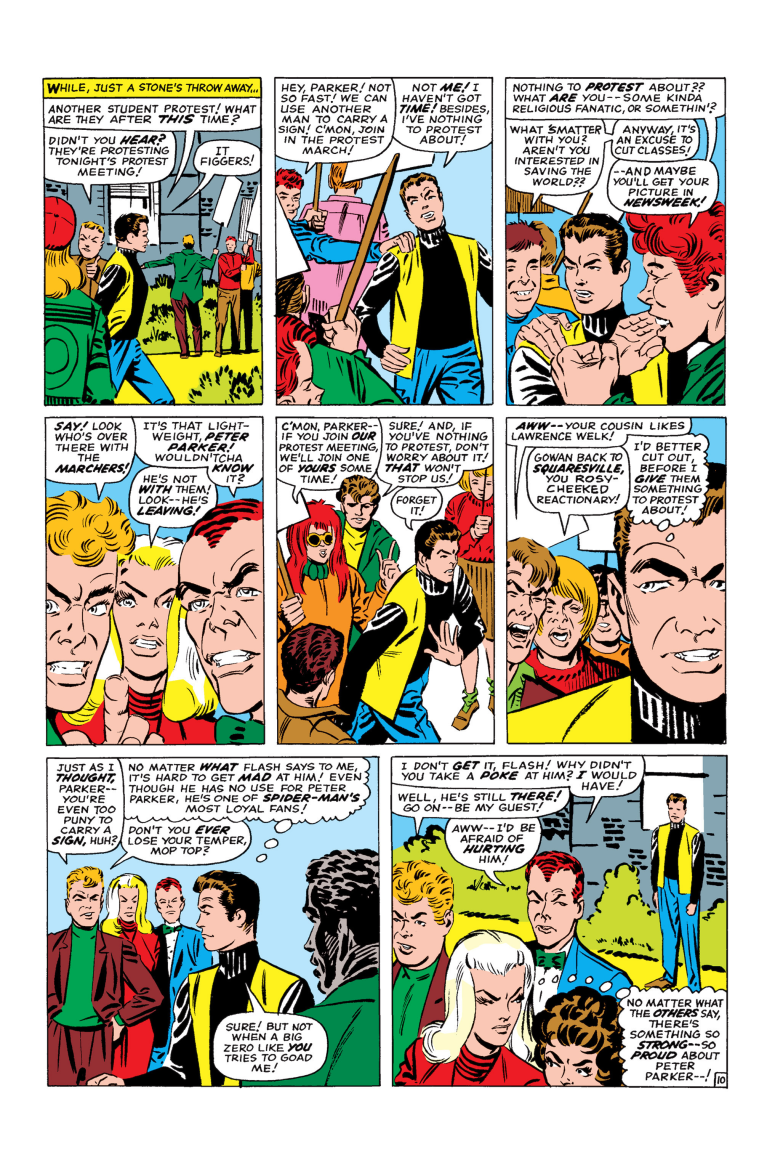
The scene is a single page, a 8 panel grid. It shows Peter walking alone past campus while Flash, Gwen, Harry who are Peter’s bullies in his college era in the Ditko run comment on the sides. The protestors are an all-white group, and they are specifically listed as “protesting tonight’s protest meeting” in other words it’s a non-political protest event. Symbolically of course the entire scene portrays college protests as somewhat frivolous so it can be seen as mocking, though as stuff goes it’s pretty mild. We also have Gwen, Harry, Flash attacking Peter because they think he’s joining the protests but then they make fun of him for being too spineless to march which attacks the hip posturing involved in performative activism.
Now as drawn and plotted by Ditko, this is a mild bit of comedy showing how the college social scene is different from the high school era but at the same time, Peter’s still misunderstood and made fun by Flash. The dialogues by Stan Lee (perhaps following Ditko’s indications), portrays a studiously non-political protest. Now you might see this as implying that all college protests are frivolous but for me, it shows this protest as frivolous in content, rather than showing protesting as being frivolous in essence, such as Robin Wright’s Jenny’s ’60s hippie arc in the movie Forrest Gump which shows the counter-culture era of the ’60s as a downward arc for the girl who tried to escape her family and ultimately get AIDS, and whose main legacy is leaving behind a kid with the “good ol’ Southern Kid” (who descends from KKK founder Nathan Bedford Forrest — yep that movie didn’t age well). One of the protestors when attacking Peter for not joining in says he listens to “Lawrence Welk” i.e. a 60s entertainer known for “champagne music”. So this isn’t exactly about political attitudes. A close reading of this scene finds it lacking in teeth, and it doesn’t seem anything that Lee or Ditko gave any time or mind to in the charting of this issue. Which stands at odds with the mountain of commentary that this protest scene has gotten.
The protest scene of ASM#38 shows the dialogue by Stan Lee as unsympathetic to the protestors exactly as the art indicated by Steve Ditko. To the extent there were clashes between them it had nothing to do with that scene. Obviously, the revelation of Lee’s own fascination with Rand and his libertarian moderate leanings happened after 2007, under Blake Bell’s biography in 2011, and Riesman’s biography in 2021, so Gaiman can’t be faulted for not having access to the freshest research. But one can well argue how a person so intelligent as Gaiman, so nuanced and learned, failed to commit the close reading to support his claim. Gaiman’s quote in the BBC documentary which aired in 2007, thanks to his great prestige and fame, legitimized the notion of the dichotomy between “Liberal” Stan Lee and Objectivist Ditko.
By doing so he gave voice, and prestige, to a critical sport that I’d like to call “Ditko-Bashing” which is to say Objectivism is only ever invoked in connection to Spider-Man to attack Steve Ditko and praise Stan Lee, with the implicit undercurrent that Spider-Man was saved from Ditko by Lee. Take NerdSync, who in 2021 released a video on their YouTube Channel, “Why Spider-Man used to suck” and discusses Ditko’s Randian influences between 34-38mns. The reading of that scene, the title of the video, and his screed against Ditko is more heat than light [9]. The subtext is again Ditko was wrong, Stan was right. And somehow Ditko and Ditko alone, is held to task for his political opinions, in NerdSync’s opinion, for implicitly making Spider-Man a supporter of the Vietnam War and against the Civil Rights, which literally has no textual support.
With regards to Vietnam why is Ditko the one singled out for blame for an apolitical scene that covers about 8 panels in a 40 issue run, when Stan Lee featured far more explicit pro-war scenes in comics of the time? It was Stan Lee who sought to situate Iron Man as a Cold Warrior capitalist superhero whose origin had him in Vietnam selling arms to the South before being attacked by communists. As much as the comic is about Stark as a reformist arms dealer, the origin paints the communists as outright bad guys. Ditko had nothing to do with Iron Man’s origin. His contribution, the red and gold armor look came later. When Ditko stepped down, Stan Lee and John Romita Sr. had Flash Thompson enlist in service and ship off to Vietnam for a tour of duty. The scene of Flash leaving for war in ASM#47 shows his friends as supportive, without any voice against the war or any quibbles about the justification for fighting. Obviously Stan Lee would never have Spider-Man enlist, but he was willing to have a prominent supporting cast member, and Spider-Man’s #1 fan enlist. As Riesman’s biography attests above, privately as the war was becoming unpopular, Lee was willing to cop to his young audience that it was a mistake but he was not committed to pulling out of Vietnam either. As Spencer Ackerman points out, publicly Stan Lee always took a neutral attitude to Vietnam in the pages of Marvel Letters, as opposed to Jack Kirby: “Over the years we’ve received a zillion letters asking for the Bullpen’s opinion about such diverse subjects as Viet Nam, civil rights, the war on poverty, and the upcoming election,” Lee wrote in the September 1968 Stan’s Soapbox. “We’re phantasmagorically flattered that our opinion would matter to you, but here’s the hang-up: there isn’t any unanimous Bullpen opinion about anything, except possibly mother love and apple pie!” (By contrast, here is Jack Kirby, a combat veteran of Patton’s Army who abhorred tyranny and war: “I didn’t like that war. I thought it was crazy. And of course, that had an effect on a generation of young people who just couldn’t understand it.”)
With regards to college protests, some people have claimed that Stan Lee showed college protests more sympathetically after Ditko left. The evidence does not exist.
Take ASM#68. Unlike Ditko’s last issue that came 30 issues prior, Lee and Romita represent an actual political protest with students. Rather than an all-white group we have a mixed group led by prominent African-American students. This issue in fact introduces Randy Robertson, the son of Joe Robertson. Randy is represented as the more firebrand son of his Dad, reflecting somewhat the split between the older Civil Rights generations and the younger activists (think MLK and Black Panthers, though neither Joe nor Randy are quite as radical as either of those two). Randy falls under the influence of an older African-American student who’s implied as a more “rock-the-boat” type. Then there’s a scene where the students ask Peter to join their protest against the Dean. And Peter says, “Okay, that’s your side of the story! What does the Dean say?” and then he walks away leading the protestors to call him a chicken. It’s virtually the same comic thirty issues later but unlike Ditko’s brief 8 panel grid which is a side gag to larger story, ASM#68 is explicitly about student politics as a major subplot, featured on the cover and the title “Crisis on the Campus” and we have Peter walk away from solidarity from an African-American led protest. Where Ditko satirized a protest as frivolous in content, Lee and Romita satirize protesting as frivolous in essence. So the question is why does this scene written and drawn after Ditko left, not subject to scrutiny of any kind? Abraham Riesman’s biography on Stan Lee is the major exception. He spotlighted this comic: Stan’s dialogue played with fire, putting words like,’ ‘Uncle Tom,’ and ‘soul-brother’ into black characters’ mouths and depicting Peter as telling them to see the administration’s side of the story and yelling, ‘ ”Anyone” can paint a ”sign,” mister! ”That” doesn’t make you ”right!”” There’s no real resolution to the political questions posed by the comic, merely a bizarre deus ex machina in which the protest leaders are arrested on the false belief that they were linked with the Kingpin, something the reader is supposed to see as a positive event because the courts will surely exonerate them. Even jail is a bonus, muses Peter: ‘And they’ll ”all” have a chance to ‘cool off!’
So with regards to politics, there was more consensus between Stan Lee and Steve Ditko than most allow. Now of course, this doesn’t mean that there’s no nuance in Lee’s engagement with politics (that’s a topic deserving of its own post), and it doesn’t mean that Ditko didn’t in fact become an Objectivist. The point to emphasize is that Randian interpretations in Spider-Man is too over-determined and disproportionate in focus.
...More recent is Al Ewing’s Captain America and the Mighty Avengers #1 where he has Spider-Man admitting that he read Rand in college and spent a week thinking he was John Galt and yelling at protestors. Al Ewing is a very smart writer with a deep knowledge of Marvel continuity and yet this is a case of over-cleverness, with Gaiman’s narrative clearly clouding his judgment over his close-reading. Because Peter doesn’t in fact yell at protestors in ASM#38, he merely seethes silently and walks away.
The Randian interpretation of Spider-Man has mostly served as a vehicle to attack Ditko. It’s a way to distance Spider-Man from his major creative voice. It’s not concerned with asking real political questions about Spider-Man as a comic and concept, of which there’s a lot. It’s not concerned with gauging Spider-Man in the context of Ditko’s life and career and his biographical trajectory. It’s not concerned with contextualizing Spider-Man with other Marvel creations of the time, by Ditko and others.
It’s not concerned with actual history.
There is a lot more in the article, especially about Dr. Strange and I would highly recommend people check it out https://elvingsmusings.wordpress.com/2022/06/07/ditko-rand-the-objectivist-spider-man/
Hey thanks for the post! It's fun to make dumb jokes but I really appreciate you taking the time to share something interesting on the topic
Gwen is queer at least. You can't just have that haircut and not be queer
The fact that the bourgeoisie genuinely have more revolutionary potential that the average American should be a point of embarrassment.
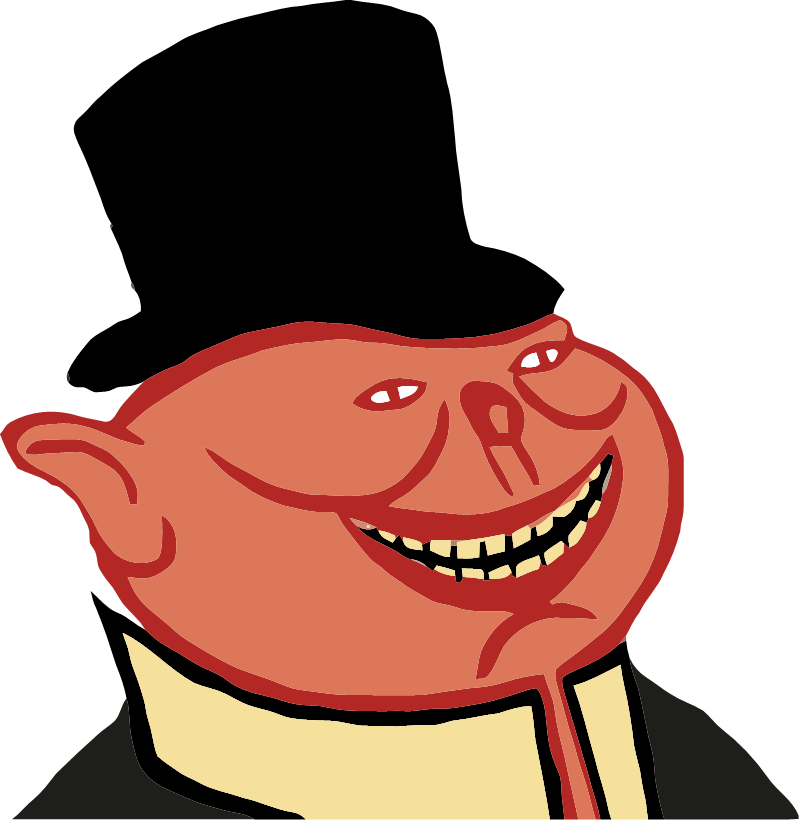 , THE MAN is sticking it to the man more than normies are.
, THE MAN is sticking it to the man more than normies are.I think the bourgeoisie exhibiting tolerance on a limited range of social issues which do not impact their economic standing should not be interpreted in any way as revolutionary potential. In my mind, this is no different than the Euro Socdem concessions like universal healthcare and annual leave.
Yeah, don't get me wrong, I mostly typed that in jest, but sometimes it is frustrating to feel like the working class can be so unreachable sometimes that capitalists seem progressive by comparison (even if I should otherwise know that's NOT the case.)











